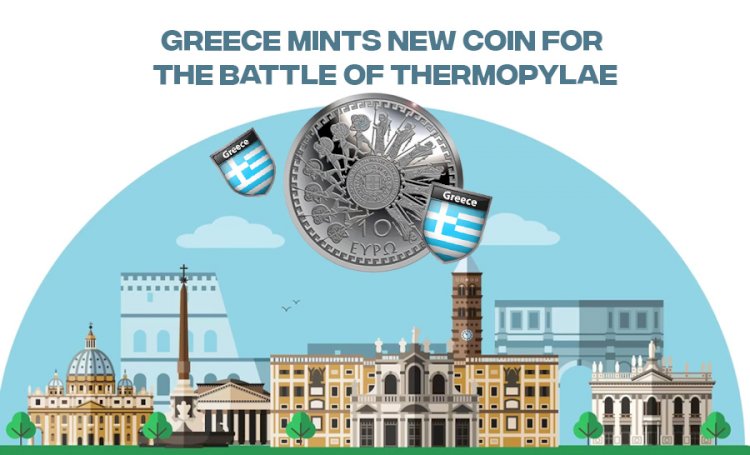Greece Mints New Coin for the Battle of Thermopylae
In this article, we want to take a look at the historic battle of the Thermopylae.

In this article, we want to take a look at the historic battle of the Thermopylae, especially in light of the fact that the government of Greece has minted a new coin in commemoration of this battle.
Around 2500 years ago, the Persian Empire, led by King Darius I, began to expand its territory towards the Aegean Sea. This expansion brought the Persians into contact with the Greek city-states, which were scattered along the eastern Mediterranean. Tensions quickly arose between the two civilizations, fueled by differences in culture, religion, and political systems.
The first major conflict between the Greeks and Persians occurred in 492 BCE, when the Persians attempted to invade Greece by sea. However, the Persian fleet was destroyed by a storm, which delayed the invasion for several years. In 490 BCE, King Darius I led a new invasion force, which landed at Marathon, a small plain in eastern Attica. The Greeks, led by General Miltiades, met the Persians on the field of battle and emerged victorious, despite being heavily outnumbered.
Ten years later, King Xerxes I, Darius's son, launched a massive invasion of Greece, which included hundreds of thousands of soldiers and sailors. The Greeks, led by the Spartan King Leonidas, made a valiant stand at the pass of Thermopylae, but were ultimately defeated. However, the Greeks were able to regroup and defeat the Persian fleet at the Battle of Salamis, which effectively ended the Persian threat to Greece.
The Greco-Persian Wars continued for several more years, but the Greeks ultimately emerged victorious, thanks in large part to their superior military tactics and their unity in the face of a common enemy. The wars had a significant impact on both Greek and Persian society, shaping their political and cultural development for centuries to come.
For the Greeks, the victories over the Persians gave them a newfound sense of pride and confidence in their own abilities. The wars also led to the rise of Athens as a major political and cultural center, which would go on to dominate the Greek world for several decades.
In Persia, the defeats at the hands of the Greeks were a major blow to the empire's prestige and power. The wars also led to a period of instability and infighting within the Persian royal family, which weakened the empire and left it vulnerable to further attacks from its enemies.
Overall, the conflicts between Greece and Persia 2500 years ago were a pivotal moment in world history, with far-reaching consequences for both civilizations. The battles that were fought during this time continue to capture the imagination of people around the world, and their legacy can still be seen in the cultures and societies that exist today.
This article has been written with the assistance of artificial intelligence (AI)

 content-team
content-team 


















